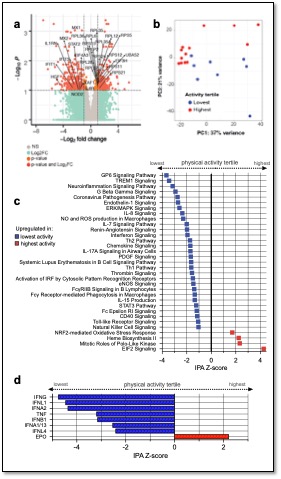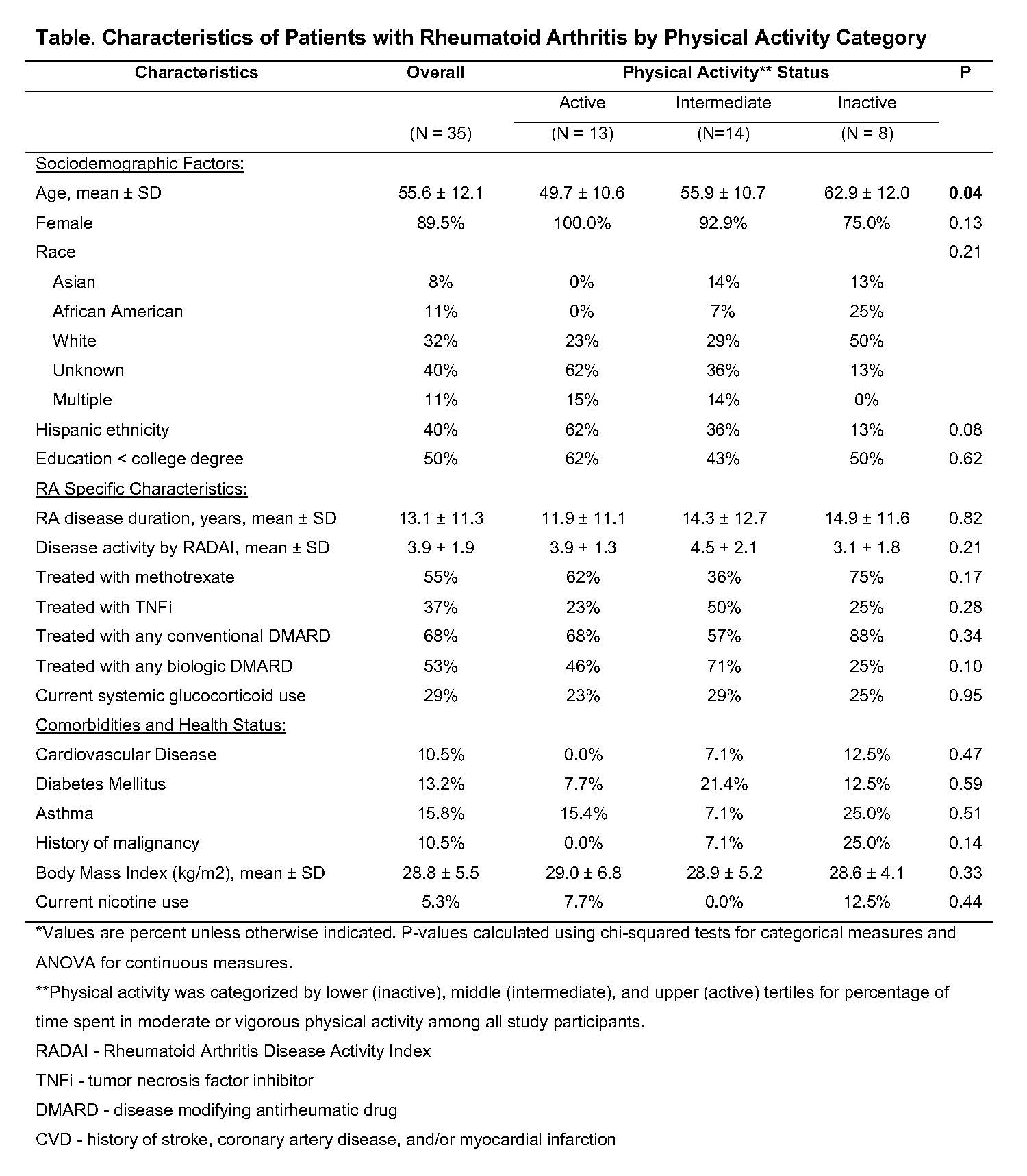Session Information
Session Type: Poster Session D
Session Time: 8:30AM-10:30AM
Background/Purpose: Prior studies show an independent association between greater physical activity and lower inflammatory markers among adults in the general population, but the impact of physical activity on systemic inflammation in people with rheumatoid arthritis (RA) is unknown. We aimed to determine whether physical activity associates with differential expression of inflammatory genes in RA.
Methods: Data derived from baseline assessments of a prospective observational cohort of RA patients. At each study visit, we obtained clinical data, collected peripheral whole blood for RNA sequencing, and provided participants with actigraphs (GT9X ActiGraph Link device) to objectively measure physical activity for 7 consecutive 24-hour periods. Physical activity groups were defined by the highest and lowest tertiles for percentage of time spent in moderate/vigorous physical activity (metabolic equivalent level ≥2.00) across the sample. RNA extraction, library preparation, Illumina sequencing, and gene expression data processing were performed using established methods. Genes differentially expressed in the most versus least physically active groups were identified using DESeq2 with the Independent Hypothesis Weighting (IHW) multiple testing procedure. Sex, age, race and ethnicity were included as covariates in the linear model. Ingenuity Pathway Analysis (IPA) Canonical Pathway and Upstream Regulator Analyses were employed on differentially expressed genes with a P < 0.1 ranked by log2 fold change to identify biological pathways most affected by physical activity.
Results: 35 patients had complete clinical, actigraphy, and transcriptomic data available for analysis. Mean age was 56 years (SD 12.1), and 90% were female. Race/ethnicity was 32% white, 11% African American, 8% Asian, and 40% Hispanic (Table). Participants spent 48%, 41%, and 12% of time awake in sedentary, light, and moderate physical activity, respectively. None of the participants achieved vigorous activity. We identified 767 differentially expressed genes between the highest versus lowest physical activity tertiles at an adjusted P value < 0.1 (Figure 1a). IPA canonical pathway analysis revealed that the most physically active patients exhibited down regulation of diverse innate and adaptive immune signaling pathways (Figure 1c). Assessment of upstream cytokine activation states demonstrated inhibition of type I, II and III interferons and activation of EPO in the highest physical activity tertile patients (Figure 1d).
Conclusion: Among a racially and ethnically diverse RA cohort, participants who spent more time in moderately intense physical activity had down-regulation of genes involved in both innate and adaptive immune signaling compared to those who were more sedentary. These findings provide mechanistic evidence to support a disease-modifying effect of physical activity in RA.
 Figure 1. Differentially expressed (DE) genes and related signaling pathways identified from peripheral blood transcriptional profiling of RA patients with the highest versus lowest tertiles of physical activity. a) Volcano plot of DE genes depicting 365 genes up-regulated in the highest activity tertile and 402 down-regulated genes at an adjusted P-value < 0.1 with respect to the highest physical activity tertile. Genes related to immune signaling and translation are highlighted. b) Principal Component Analysis based on the DE genes demonstrates separation of patients based on tertile of physical activity. c) Ingenuity Pathway Analysis (IPA) based on differential gene expression analyses demonstrating expression of canonical signaling pathways. Significant IPA results were defined as those with a Z-score absolute value greater than 2 or an overlap P value < 0.05. Depicted are the top three up- and down-regulated canonical pathways based on Z-score, as well as all pathways related to immunity and inflammation with an |Z| > 1 and overlap P value < 0.05. d) Predicted activation state of upstream cytokines in the highest versus lowest physical activity tertiles. Cytokines with a |Z| > 2 and overlap P value < 0.05 plotted.
Figure 1. Differentially expressed (DE) genes and related signaling pathways identified from peripheral blood transcriptional profiling of RA patients with the highest versus lowest tertiles of physical activity. a) Volcano plot of DE genes depicting 365 genes up-regulated in the highest activity tertile and 402 down-regulated genes at an adjusted P-value < 0.1 with respect to the highest physical activity tertile. Genes related to immune signaling and translation are highlighted. b) Principal Component Analysis based on the DE genes demonstrates separation of patients based on tertile of physical activity. c) Ingenuity Pathway Analysis (IPA) based on differential gene expression analyses demonstrating expression of canonical signaling pathways. Significant IPA results were defined as those with a Z-score absolute value greater than 2 or an overlap P value < 0.05. Depicted are the top three up- and down-regulated canonical pathways based on Z-score, as well as all pathways related to immunity and inflammation with an |Z| > 1 and overlap P value < 0.05. d) Predicted activation state of upstream cytokines in the highest versus lowest physical activity tertiles. Cytokines with a |Z| > 2 and overlap P value < 0.05 plotted.
To cite this abstract in AMA style:
Patterson S, Sun S, Rychkov D, Tsitsiklis A, Hayakawa Serpa P, Katz P, Langelier C, Sirota M. Physical Activity Moderates Inflammatory Gene Expression in Rheumatoid Arthritis [abstract]. Arthritis Rheumatol. 2021; 73 (suppl 9). https://acrabstracts.org/abstract/physical-activity-moderates-inflammatory-gene-expression-in-rheumatoid-arthritis/. Accessed .« Back to ACR Convergence 2021
ACR Meeting Abstracts - https://acrabstracts.org/abstract/physical-activity-moderates-inflammatory-gene-expression-in-rheumatoid-arthritis/

